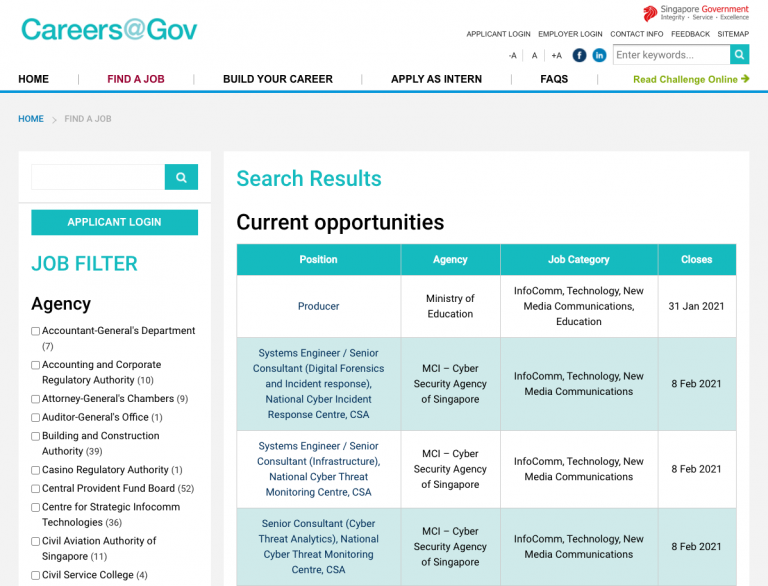Fresh graduates are often faced with a difficult decision when entering the job market for the first time. If you are a new graduate, especially in the competitive job markets of Singapore, the question between entering the private or public sector can define the first few years of your career, and even the middle and later years depending on your progression.
As a Fresh Grad, Should I Work in a Government Job or Private Sector?
Before we go into the various benefits and drawbacks of both sectors, it is important for you to remember that the decision between private and public is not final. Many graduates who enter one sector do so for reasons that are beneficial to where they are at that point in their lives before moving into another.
What you should remember, however, is that progression is about planning, and while your first career step might be a choice between one sector and another, you should understand both landscapes if you wish to navigate them successfully.
What types of Government Jobs Are There for Fresh Grads?
Public sector jobs in Singapore can be more diverse than you think, from the education sector in both teaching and local council positions to the medical industry as caretakers, doctors and administrators in public hospitals.
The right job, of course, will depend on your qualification, and the Singapore government’s Careers@Gov website has an extensive list of vacancies to help you get a better idea of what is available to you.

Singapore’s bustling public sector opens many avenues for graduates to enter under the wider umbrella of government employment. This presents several benefits that are perhaps especially tailored to young careers. These benefits can certainly give you an advantage of stability and early access in an ever-developing job market, but they can also have drawbacks that might only be apparent a few years in.
The good news, however, is that these benefits are still ultimately advantageous to new graduates, and the drawbacks can be mitigated with a sufficient amount of foresight, mentorship and market understanding.
With that said, let’s break down the pros and cons of Singapore’s public sector, beginning – of course – with the reasons why it might be a good career choice for you.
Benefits
Higher Entry Salary
Government positions often provide higher entry level salaries to new graduates entering the job market. This is partly down to public funds being made available to fund the next generation of skilled labourers in an effort to stimulate the economy now and safeguard future growth as you learn your trade and continue to contribute to your industry.
A higher entry salary doesn’t just benefit government and the economy, however. It has obvious benefits for you as an emerging graduate. You may find that entering the job market also means needing to change your accommodation to be closer to your place of employment. It may also mean needing to make concessions for transportation, whether budgeting for commutes – which most on-campus students may not have had to consider previously – or renting your own car if work travelling involves more than just moving between your house and job.
A higher entry salary can also have an advantage in helping you earn a higher credit score earlier in your career, which has long term benefits when it comes to seeking home loans should your accommodation needs expand or business loans should you look to open your own practice later on.
Higher entry-level salaries is one of the biggest benefits to the public sector and can help you get an early start on building the life and career you aspire for at the first step.
More consistent work condition regulation
Public sector positions, of course, are also under stricter regulation and oversight than their private sector counterparts. This is due, in part, to governments wanting to reduce wastage of tax funds by ensuring optimal working conditions, and also a public responsibility towards labourers.
More stable regulations have benefits beyond safeguarding working conditions, however. Work environments that are better structured to protect their work force from fatigue, excessive stress and unfair working conditions often lead to more productivity and the kind of longevity that can sometimes be ground down by the fast-paced nature of the private sector.
Better regulation also means stronger employment practices that decrease the chances of unfair dismissal and hiring policies. For native Singapore workers, there is also the added benefit of being prioritised in the public sector as government looks to funnel funds firstly through citizens who are more likely to contribute to the country over the course of their lives.
Potentially meaningful work
Working in the public sector also means aligning your career with public interest, as your job will be created and maintained through public taxes. As a result, the expectation will be that your job should contribute value directly back to the people levying for it.
This kind of work can have benefits beyond finances. If you are a graduate who is particularly passionate about your field, public sector work can provide you with opportunities to contribute meaningfully back to society while also earning a competitive early wage.
The emotional and political fulfilment of public sector work should not be overlooked. While it may be easier for you to focus on the material gains of early public sector life, public service can also put you in positions to learn unique and nuanced perspectives about how your industry impacts wider society, and how you can position yourself to contribute.
Stability
If you are recently graduated, it may be that you have many preconceived ideas about what your industry looks like. This idealised working environment could be something you picked up during job searches, or it could have been manifesting throughout your entire tertiary education career. If this is the case, the reality check of entering a robust working environment can be a shock to overcome for some. This is nothing to be ashamed of – it’s a reality of life and the job market, and many professionals will find themselves continually surprised even well into their middle and later years.
These surprises are also not always rooted in graduates’ heads. Many sectors can change dramatically between the time graduates first choose their degrees of choice and when they actually graduate. This means that the best thing for you, sometimes, is to enter into an industry where you are better protected against unexpected change to allow you to safely adapt to it.
The public sector offers this stability in that policy and practices don’t tend to change much in reaction to shifting markets. Indeed, with much of the money invested into the public sector relying on reliable projections of market activity and minimal shifts.
If you are a new graduate, it would be wise to also assess the stability of your chosen industry, and make your early career choices according to not just where you could earn more money, but where risks are better managed. In many cases, stability is as beneficial as growth.
Better Benefits
Public sector positions tend to have better regulation around additional benefits, with many offering dental, healthcare and security benefits to supplement a higher lower level salary. These benefits coming as part of your contracted work can serve to lower your expenses for additional services you might have otherwise had to pay for out of pocket
The saying often goes that the best businesses don’t just increase profits, they cut down on unnecessary spending, and this is exactly the advantage available to you if your public sector job includes health and security benefits.
Drawbacks
Slow Career Growth
It may be a benefit to the public sector that it’s dedication to stability is centred around keeping people employed. The downside to this, however, is that stability often comes at the cost of upward mobility.
In a bid to minimise the kind of moving parts that lead to both a healthy vertical corporate culture and a dangerous high turnover, public sector employees will often be far more conservative in their promotions and reshuffling at lower level positions.
This doesn’t mean that the door to middle and upper management will be barred from you, it simply means that progression can be slower. This may not be something you consider when first looking for a new job. It might not even be something that becomes overwhelmingly evident in your first few years of employment, but it is something you should understand about the nature of public sector employment.
Lower pay in higher positions
While public sector work might offer a higher initial salary, this does come with the caveat that public sector jobs tend to pay less than their private sector counterparts in middle and upper management positions. As you grow in the public sector, you might find that your salary is adjusted as you climb the ladder, but is also subject to industry-wide salary caps.
This is because the public sector might be able to pay more upfront to create viable job opportunities for fresh graduates, but it also has to balance this by mitigating bloated salaries in higher positions. After all, the public sector is still accountable to taxpayers and has to be responsible with how it distributes tax money into the job sector.

What types of Private Sector Jobs Can I Find as a Fresh Grad?
Singapore’s private sector is certainly geared towards growth in key industries over the next five years. It also offers fast-paced markets that can lead to rapid career rises and company projections. The inverse is that it’s also a sector with a higher risk element – which is why private sector companies invest so heavily in risk management.
This sector often includes more finance-based vocations like accountancy, business management, and executive coaching. It also has a higher focus on management positions and administration geared towards market influence.
Singapore is especially geared to see growth in the banking and tech industries in the next five years as companies look to take advantage of the medium term need for digital and engineering infrastructure and economic restructuring.
Benefits
Higher Salary Caps
The private sector is where money moves and so do people. It’s a high investment, high turnover collection of industries and the massive volumes of money on hand – combined with less defined salary regulations – means that salaries in middle and upper management cap much higher than in the public sector.
Depending on the company, this can be true too at entry level positions, as privately owned companies compete with each other to attract the best emerging graduates. Ultimately, competition is what defines the private sector, and for this reason, if you as a graduate can ensure that you stand out from your peers, you put yourself in a position to negotiate for a lucrative entry contract.
More expansive portfolios
Competition in the private sector also breeds diversity. The nature of the varying work means you may have the opportunity to build a much more diverse portfolio than you would in the public sector.
A diverse portfolio has two key benefits. The first is that it rapidly increases your experience by putting you in positions to learn different aspects of your industry by working with companies that have unique needs and requirements of its staff.
The second benefit comes down to future-proofing your next job application. Two applicants with the same qualifications and similar years of experience will often be differentiated by their portfolios in the private sector. Ensuring that yours is expansive can give you the edge when it’s time to move from entry positions to the next level, either at your current company or another in the private sector.
Market positioning
The private sector is a growth haven for many start-ups in the modern era. It’s a sector that heavily favours and invests in entrepreneurship and innovation. As a graduate, this sector puts you in a unique position to help companies rise from the ground up and gain the kind of experience that cannot be found as easily in more established businesses.
Positioning yourself early in a start-up that goes on to become a success can also help you fast track your career by growing with a company and seeing your benefits rise with its value. Ultimately, this aspect of the private sector will require some risk assessment from graduates who will have to weigh up the present market with a potentially rewarding future.
Faster vertical progression
With its focus on growth, entrepreneurship and competition, the private sector sees many companies fluctuate in their value and aims almost every year as they strive to be competitive. If you can prove your ability to adapt to rapidly shifting markets, you can put yourself in the eye of executives looking for management that can steer a ship through choppy waters.
There is a potential for rapid promotions in this. However, it requires a graduate who is fast-thinking, innovative and proactive, who knows how to seize an opportunity and present their best selves to executives.
Drawbacks
More competitive job market
Competition, of course, is not always positive, especially for young graduates who, at times, can be seen as commodities to be traded in the private job sector. Many graduates understand the intrinsic benefits of learning to move within the private sector, and as a result, there will be many of you fighting over a finite number of positions if you wish to enter an established company.
Even start-ups will have their picks of hungry young professionals who want to stand out. This competitive job market can be stressful, and one should consider the risk of trying to start out in a much more competitive professional environment.
You will also be competing with young professionals who cut their teeth in the public sector and come into the private market with a level of experience that you might not have yet. For many, it is an end point rather than a start point, and you should consider if this is the market for you to learn in.
Less stable work
This competitive professional environment also applies once you’ve earned a job in a private company. It may not be that your position is constantly under threat, but with many qualified graduates in the wings, replacing you won’t always be as difficult as it might be in the public sector where positions are less coveted.
This lack of stability doesn’t necessarily represent the best environment for a fresh graduate to get their feet under themselves, especially with the added pressures of life after graduating.
Fewer Benefits
Private sectors also grow through fewer regulations and oversight, with companies much more autonomous in their practices and policies. With this in mind, you should always be aware of how and where your industry can shift on a dime with fluctuating trends and the impact this will have on your industry, your employer and your job.
Less Regulation
This lack of regulations also means that job benefits aren’t standardised across companies. While many private companies might offer unique and even better benefits than their public sector counterparts, many won’t offer even the basics.
This, combined with a lower entry-level salary for many positions, might mean you pay the cost much early for potential future gains.
Ultimately, understanding the industry that’s right for you will be a personal decision, but it will be important to have knowledge on both as well as a plan built according to what your end game is. Don’t fret, though. Combining knowledge with good planning can be what separates you from other graduates.






